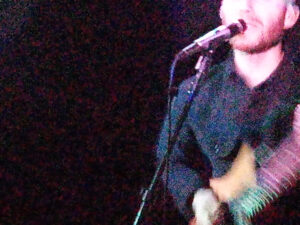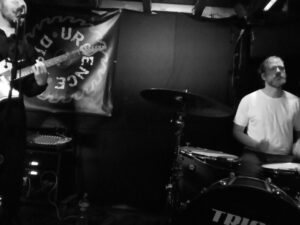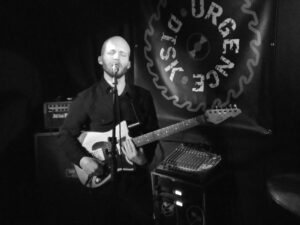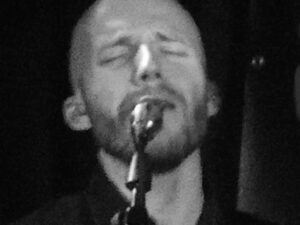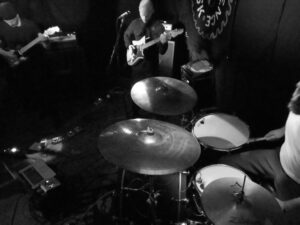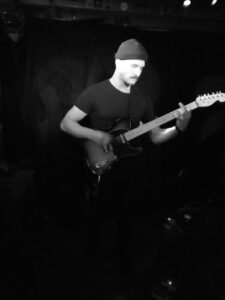
The music of the american trio DROSE is a non-identified object in many regards. It’s a kind of slow and deconstructed industrial metal, where field recordings of sounds in a factory – the one where Dustin Rose, the thinking mind behind the band, works – are on equal terms with instruments and sometimes seem to impose their own relentless pace in a man-machine mimetism that is the very own source of inspiration of DROSE. Wether it is on the unique object/record published by the label Computer students (compiling their last album and several other recordings) or during one of their meticulous live performances, the encounter with this band is sure to have an effect on you. After going though that experience at their Urgence disk (Geneva) gig, I felt like following up with a bunch of questions I sent to Dustin by email.
This is your first time as a band touring Europe. What type of experience has this been so far ?
It’s been great! We have been shown excellent hospitality and the shows have been well attended.
The name DROSE seems to suggest that Dustin is central in the creation of your music. Is that the case ? I’ve read that your songwriting starts with the drums but can you shed more light on the process that leads to the writing of your songs ?
It’s true and the songs are usually written starting with a drum composition. The drums are very foundational in this music, so this is where I begin. I find it easy to explore different frameworks from the strongest rhythm element.
The creation of very particular soundscapes is obviously a major part of your music, with a sense of compressed space and the use of machine noises being key elements. Does this come first and do you have to work ways to recreate this sound during your live performances ? Would it be right to say that, in this respect, DROSE is similar to a studio band ?
I collect interesting audio when I come across it and then sort out how I can use it later. In order to bring this audio with us for live performances I have built some equipment to make that possible. We are able to reproduce any sounds from the recording in a live performance.
In particular, I noticed the drums were equipped with a sound system during your gig in Geneva. Can you tell us more about this system ? Are they used to modify the sound of the drums or to activate loops ?
I use pure data (puredata.info) to program our live sets or recordings. The drum sensors and foot switches are brought into pure data using a Teensy micro controller to play and manipulate sound files, synthesized or live audio. The audio is triggered in real-time, there is no click track, it keeps the performances expressive. The program counts drum hits in some sections, waits for button presses or is even allowed to behave randomly in some sections of songs.
The relation between man and machine is a theme running though « Boy man machine ». Would you say that this album is a concept album and, by extension, do you see DROSE as a concept band ?
It’s OK to call it a concept album I was attempting to describe an entire idea. I am not sure DROSE is a concept band.
A very dark, anguished outlook on the relation between man and the machine emerges from your music. Is this just a theme to expand on artistically or can you also see political and ethical implications ?
Some of the ideas or tales of the songs are parallel with political or sociological happenings but it was not a direct intent. boy man and machine are a closed system, each effecting the other and representing thoughts, feelings, situations or experiences.
I heard you met Julien Fernandez of Computer students while he was on tour with his former band, Passe-montagne, and you were involved in setting up shows in your city. Can you tell us the story of your relationship with him ?
Julien was traveling with his band Passe Montagne. I believe it was 2009 or 2010 summer. My band Toads and Mice hosted Passe Montagne and The Conformists in Dayton Ohio. We were all friends instantly, it was a great time.
I hardly know anything about the musical and artistic scene in Columbus, Ohio. How does a band such as yours fit in with the local scene ?
The Columbus Ohio music scene was very hospitable to DROSE, I am grateful to everyone who has ever came to a show, bought something or shared.
I’ve been told there’s a new DROSE album in the works. How do you approach this new recording and what do you expect from it ?
That’s true! This material has a different sound but it’s the same DROSE.
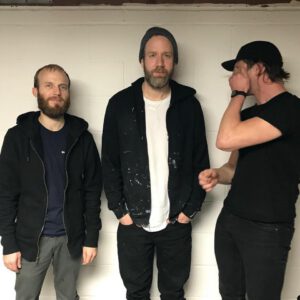
>>>>>>>>>> DROSE
>>>>>>>>>>> COMPUTER STUDENTS

